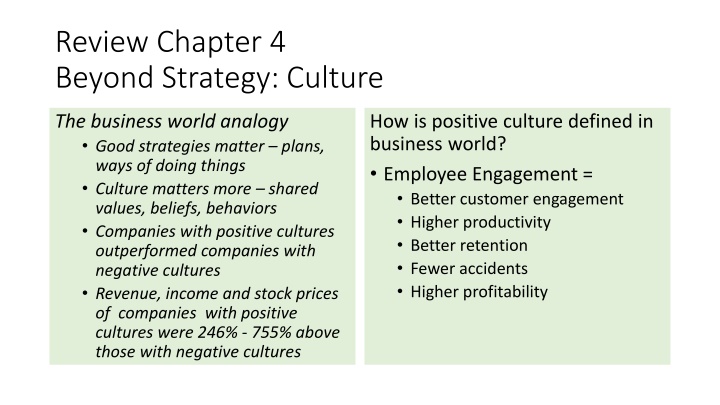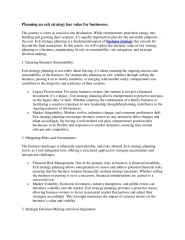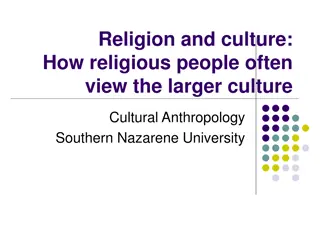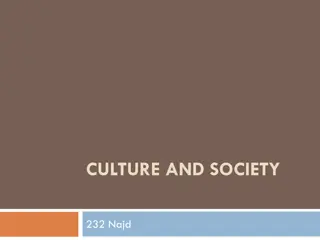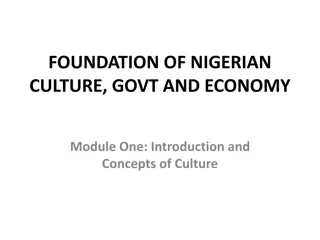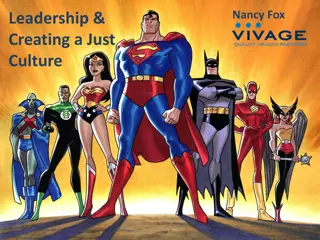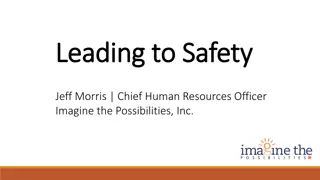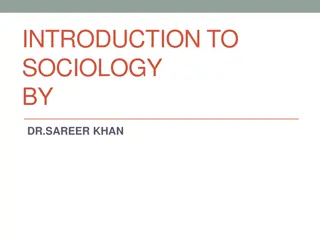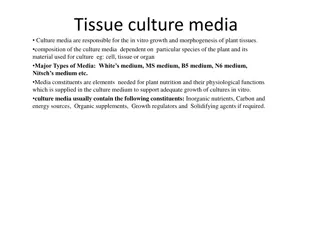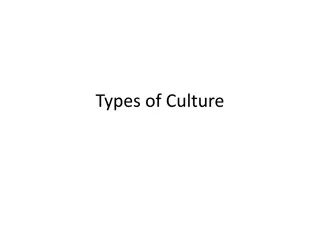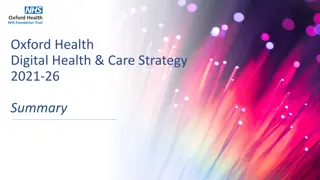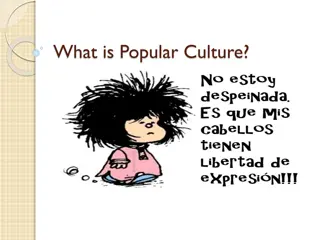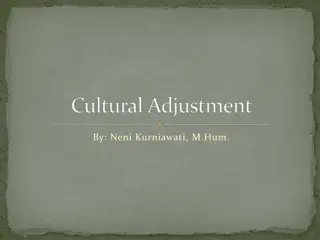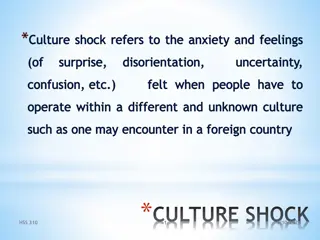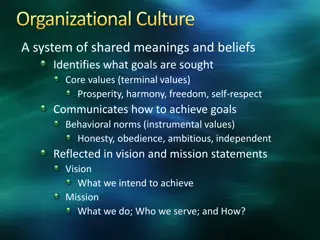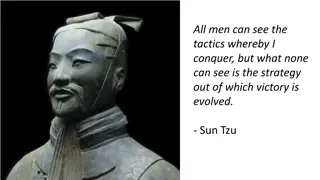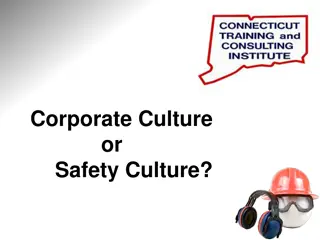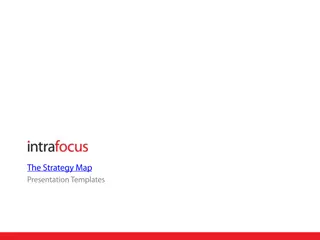Beyond Strategy: Culture
Positive culture in the business world is defined by shared values, beliefs, and behaviors that lead to improved performance and profitability. Companies with positive cultures outperform those with negative cultures, resulting in higher revenue, income, and stock prices. Cultivating a positive culture enhances employee engagement, customer engagement, productivity, retention, and overall success. The concept of culture, belonging, and inclusion is crucial across various environments, impacting the effectiveness of strategies and the sense of access and belonging for individuals. The AACU Inclusive Excellence Scorecard highlights key elements for fostering diversity and inclusivity in educational settings.
Download Presentation

Please find below an Image/Link to download the presentation.
The content on the website is provided AS IS for your information and personal use only. It may not be sold, licensed, or shared on other websites without obtaining consent from the author.If you encounter any issues during the download, it is possible that the publisher has removed the file from their server.
You are allowed to download the files provided on this website for personal or commercial use, subject to the condition that they are used lawfully. All files are the property of their respective owners.
The content on the website is provided AS IS for your information and personal use only. It may not be sold, licensed, or shared on other websites without obtaining consent from the author.
E N D
Presentation Transcript
Review Chapter 4 Beyond Strategy: Culture The business world analogy Good strategies matter plans, ways of doing things Culture matters more shared values, beliefs, behaviors Companies with positive cultures outperformed companies with negative cultures Revenue, income and stock prices of companies with positive cultures were 246% - 755% above those with negative cultures How is positive culture defined in business world? Employee Engagement = Better customer engagement Higher productivity Better retention Fewer accidents Higher profitability
Beyond Strategy: Culture Without positive culture in a school, equity strategies will underperform. Culture and belonging must precede inclusion and engagement strategies. Environment = climate + culture Climate is the heart and soul of the environment do people feel like they belong? Culture is the way we do things around here - norms, values, beliefs, traditions, and rituals that build up over time
Excluded People are outside of the culture, denied access because they are unable to meet the membership standards of belonging
Segregated People are in a subordinate culture, separated from the mainstream culture, where they experience a sense of belonging but disproportionately low access
Integrated People are in the dominant culture, having access but belonging remains conditional, based on the degree to which people are able to achieve and conform to academic and social standards of the dominant culture
Included People are of the culture, co- creating and experiencing access and belonging through a process of systemic and cultural transformation
American Association of Colleges and Universities (AACU) Inclusive Excellence Scorecard FOUR ELEMENTS OF FOCUS FOUR CATEGORIES FOR SCORING 1. A focus on student intellectual and social development 2. A purposeful development and utilization of organizational resources to enhance student learning 3. Attention to the cultural differences learners bring to the educational experience that enhance the enterprise 4. A welcoming community that engages all of its diversity in service of student and organizational learning 1. 2. Access and Equity Diversity in the formal and informal curriculum Campus climate Student learning and development 3. 4.
Chapter 5 Beyond Respect: Dignity Dignity is not the same as respect. Dignity: the innate, equal worth of each human being simply because that person is human We are born with it but we aren t born with an understanding of how recognize, reclaim, or extend it to others Donna Hicks: an internal state of peace that comes with the recognition and acceptance of the value and vulnerability of all living things
Indicators of Belonging 4 States of Being Appreciated - having parts of your identity admired and positively noticed and/or represented by people, media, others Validated - having your lived experiences, thoughts, and/or feelings recognized and accepted as real, even if the other person(s) has not experienced similar things and may even disagree with the issues involved in your experience Accepted - having your personhood completely embraced and regarded favorably without conditions attached to full belonging Treated Fairly having interactions defined by fairness and justice according to your specific circumstances, which may mean not being treat the same as others in order to ensure access to opportunities
How can we know if a person feels they belong? Examples of Various Dimensions of Difference Ability Accent Age Appearance Background Body Size/Shape Class Culture Education Ethnicity Gender Job/Title/Role Politics Race Religion/Faith Sexual Orientation Style Values
Hickss 10 Essential Elements of Dignity Acceptance of Identity support expression of people's authentic selves without judgment Safety put people at ease, physically and psychologically Recognition validate people Independence enable agency Acknowledgement respond to concerns Understanding listen to perspectives Inclusion welcome and issue invitations Benefits of the Doubt extend trust Fairness treat people with equity Accountability apologize for causing harm
Chapter 6: Recognize Distortions of Dignity Othering is the problem Us vs. Them mentality Innate hostility toward the unfamiliar The instinct to perceive and push back against those who are different than us Feeling superior over those we consider inferior
Cultures That Honor or Violate Dignity Culture of Dignity Culture of Indignity A foundation for equity and inclusion A foundation for inequity and exclusion NORMS Presume Competence and positive intent Presume Incompetence Build partnerships and community Dominate Repair harm and restore relationships Blame and shame Affirm differences and uniqueness Degrade differences
Cultures That Honor or Violate Dignity Culture of Dignity Culture of Indignity A foundation for equity and inclusion A foundation for inequity and exclusion Experiences Belonging Othering Appreciated Otherized Treated fairly Mistreated Accepted Marginalized Validated Dismissed
Cultures That Honor or Violate Dignity Culture of Dignity Culture of Indignity A foundation for equity and inclusion A foundation for inequity and exclusion Core Dispositions Empathy Apathy Openness Judgment Patience Intolerance Listening Denial
Cultures That Honor or Violate Dignity Culture of Dignity A foundation for equity and inclusion Culture of Indignity A foundation for inequity and exclusion Core Values Inclusion: Exclusion, Integration, Segregation: Unconditional belonging (belong to achieve) Conditional belonging (achieve to belong) High access Low access Honoring dignity is the precursor to cultural responsiveness and any other equity methodology ever conceived past, present or future.
We are wired to violate dignity We are instinctively aware of our own vulnerability of human dignity We all want to be accepted and treated as if we matter In a perverse way, we can weaponize this human vulnerability by seeking to diminish others feelings of belonging We seek to seize control so that we can feel safe rather than vulnerable It s a natural human failing that when we feel our own dignity is vulnerable, we can be tempted to violate the dignity of others
Hickss Temptations to Violate Elements of Dignity Take the bait: letting the bad behavior of others determine your own for the purpose of getting even Avoid Conflict: allowing someone to violate your dignity without speaking up for yourself Save Face: lying to cover up or deceive others to prevent looking bad in the eyes of others Play the Victim: claiming innocence in failed relationships Shirk Responsibility: refusing to admit it when you have made a mistake and shifting the blame onto someone else Resist Feedback: deflecting feedback about your blind spots that others can see and you cannot Seek False Dignity: gaining one s sense of self-worth from external sources instead of relying on one s inherent self-worth Blame or Shame Others to Deflect Your Guilt: not being able to tolerate being exposed of a wrongdoing; instead, placing blame on others Seek False Security: remaining in a relationship in which your dignity is routinely violated Gossip: talking about others in a negative way in order to connect with others
Deficit Thinking Deficit Thinking is the notion that students, particularly low income, minority students, fail in school because they have inherent inadequacies that obstruct the learning process Limited intelligence Lack of motivation Inadequate home socialization Deficit Thinking grants educators permission to blame students for their poor performance within a system that sends them countless signals that they do not belong Deficit Thinkers look outward toward the students and not inward toward their own role (and the role of the dominant culture) in these students experiences
Mitigating the Effects of Negative Stereotypes Normalize belonging uncertainty Routinely share personal stories Continually affirm people Practice perspective taking Help people work together successfully Extend positive greetings at the door
Q: How can we know if a person feels they belong? Answer: Ask ourselves another question - Have we honored or violated their dignity?
